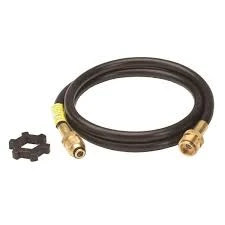ethanol fuel hose
Dec . 05, 2024 00:24 Back to list
ethanol fuel hose
The Importance of Ethanol Fuel Hose Ensuring Safety and Efficiency
As the world seeks more sustainable energy sources, ethanol has emerged as a prominent alternative to conventional fossil fuels. With its renewable origins, primarily derived from corn and sugarcane, ethanol not only reduces greenhouse gas emissions but also supports agricultural economies. However, the utilization of ethanol as a fuel requires careful consideration of the materials used in fuel systems, particularly the hoses that transport these biofuels. This is where ethanol fuel hoses play a crucial role, ensuring safety, efficiency, and longevity in fuel systems.
Understanding Ethanol as a Fuel
Ethanol is often blended with gasoline to create fuel blends such as E10 (10% ethanol, 90% gasoline) or E85 (85% ethanol, 15% gasoline), which are popular among environmentally conscious consumers. While these blends provide significant environmental benefits, they also pose challenges for traditional fuel system materials. Ethanol can absorb water and is more corrosive than gasoline, which can lead to degradation of standard rubber and plastic materials used in fuel hoses.
The Composition of Ethanol Fuel Hose
To address these challenges, ethanol fuel hoses are specifically designed and manufactured using materials resistant to the unique properties of ethanol. Typically, these hoses are made from a combination of synthetic rubber compounds and reinforced with braids of nylon or other durable materials to provide additional strength and flexibility. This construction not only protects against the corrosive effects of ethanol but also minimizes the risk of leaks, which can be both hazardous and costly.
Key Features of Ethanol Fuel Hose
1. Compatibility Ethanol fuel hoses must be compatible with various ethanol blends. This means they can withstand different concentrations of ethanol without deteriorating or compromising the integrity of the fuel system.
ethanol fuel hose

2. Durability Given the corrosive nature of ethanol, the hoses need to have high resistance to wear and tear. Their construction should endure extreme temperatures and pressures typically encountered in automotive applications.
3. Flexibility Ethanol fuel hoses must remain flexible even in low temperatures to facilitate easy installation and routing within the fuel system. Rigid hoses can crack or break, leading to failures that could jeopardize vehicle safety.
4. Safety Standards Ethanol fuel hoses are subject to rigorous safety standards and testing to ensure they perform efficiently under operational conditions. Compliance with these standards helps prevent issues such as leaks and fuel contamination.
5. Environmental Resistance The hoses should be resistant to environmental factors such as UV light and ozone, which can degrade standard materials over time. This ensures they remain functional and safe throughout their lifespan.
The Consequences of Using Incompatible Hoses
Using a standard fuel hose that is not designed for ethanol can lead to serious issues. These include hose swelling, cracking, or complete failure, which can result in fuel leaks. Such failures not only create a significant safety risk, including fire hazards, but can also result in costly repairs and increased emissions due to improper fuel combustion. Moreover, degraded fuel hoses can contaminate fuel systems with particles and chemicals, leading to engine inefficiency and potential damage.
Conclusion
As the adoption of ethanol as a fuel continues to rise, understanding and implementing the use of ethanol fuel hoses becomes increasingly important. These specialized hoses ensure that vehicles and machinery can operate effectively and safely, while also supporting environmental sustainability. In the quest for energy alternatives, the integrity of fuel systems is paramount. Choosing the right components, such as ethanol fuel hoses, is a critical step in achieving a greener future without sacrificing performance or safety. As consumers and manufacturers alike embrace renewable fuels, the role of reliable, high-quality fuel hoses cannot be overstated. Investing in the right fuel system components is essential for both the longevity of vehicles and the overall health of our planet.
